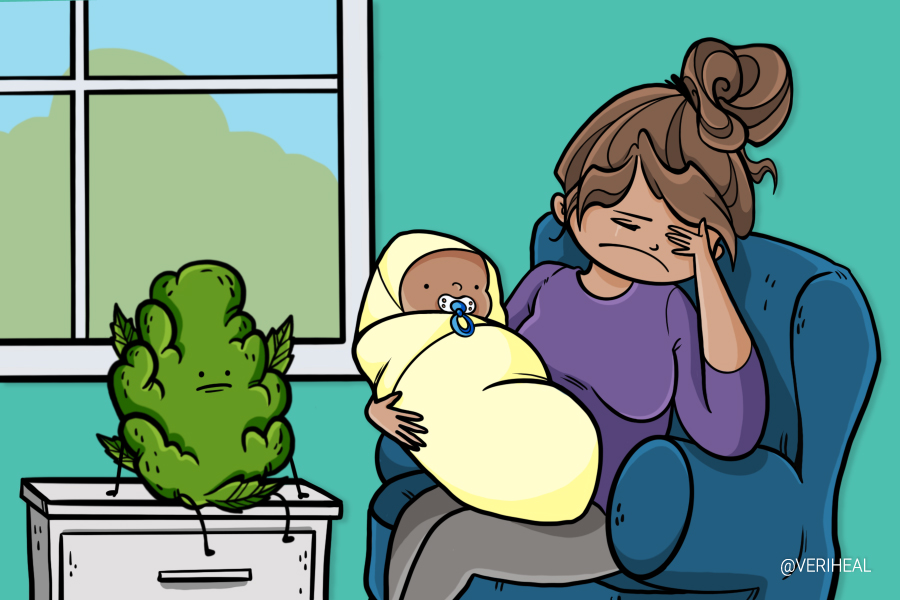Giving birth is a very emotional time. The most common emotions associated with giving birth to your own child are obviously excitement, happiness, and maybe even anxiety but many women even experience depression. This type of depression is known as postpartum depression and is often referred to as the “baby blues”. We know that cannabis can help with the symptoms associated with depression, but does the same hold true for postpartum depression? Let’s find out!
What is Postpartum Depression?
Postpartum depression is a common condition experienced by women who have just given birth. Like standard depression, it includes mood swings, crying spells, anxiety, and difficulty sleeping and the condition typically presents within two-three days after delivery and can last weeks. However, there is a noteworthy difference between postpartum depression and the baby blues. Postpartum depression is more severe and longer-lasting. Symptoms of postpartum depression can range from mild to severe and lasts for weeks to months while the “baby blues” only last a few days to a few weeks.
Symptoms Include:
When postpartum depression moves beyond being “baby blues”, the new mom may experience additional symptoms that are significantly more severe. If symptoms continue to get worse or have not diminished after two weeks, it would be wise to consider reaching out to a medical professional.
More Severe Symptoms Include:
- Overwhelming fatigue
- Anxiety attacks
- Thoughts of suicide, self-harm, or harming others
- Feeling unworthy or shameful
- Hopelessness
- Withdrawing from family and friends
Postpartum depression may be defined as a condition that’s exclusive to women who have just given birth that manifests because of the dramatic fluctuation of hormones, but new fathers can experience it as well. Fathers at risk include those who are young, have a history of depression, or are struggling with issues such as the relationship with mum and finances.
Why You Should Get Your Medical Marijuana Card
Veriheal has satisfied millions of patients nationwide by giving them access to these benefits
- Larger purchase limits
- Peace of mind
- Enhanced legal protection
- Access to higher potency strains
- Save up to 25% on cannabis purchases
- Skip the line at the dispensary
A study published in the US National Library of Medicine found that 15% of mothers experience postpartum depression but that the numbers are likely to be higher since so many women don’t report their experiences. This condition can be quite traumatic for mothers as they struggle to connect and bond with their baby, which is why finding an EFFECTIVE treatment is imperatively necessary.
How Does Cannabis Help?
Cannabis works with the body’s endocannabinoid system (the ECS), which is responsible for maintaining processes that aid in maintaining homeostasis, such as reducing inflammation. Dr. Haj-Dahmane investigated cannabis for depression and explained that “using compounds derived from cannabis -marijuana- to restore normal endocannabinoid function could potentially help stabilize moods and ease depression”.
Women diagnosed with postpartum depression are often prescribed pharmaceutical medication, particularly antidepressants, as well as therapy. However, taking certain medications just after birth presents some concerns, especially if the mother is nursing. Studies have shown the risks of taking these kinds of pharmaceuticals while breastfeeding. Can cannabis be the effective solution to relief from postpartum depression? All signs point to yes but what does research have to say about breastfeeding and cannabis use? The current research on cannabis use while breastfeeding is thin but professionals, such as Dr. Yasmin Hurd, explain that “even in early development, marijuana is changing critical circuits and neurotransmitter receptors” and that the potential consequences of transmitting the psychoactive through breastfeeding aren’t worth the risk.
New mothers are also prone to insufficient levels of an endocannabinoid known as anandamide. This endocannabinoid is responsible for regulating appetite and mood. Since the cannabinoid THC shares an identical chemical structure to anandamide, it can interact with the body in the same manner which the anandamide does. In other words, cannabis containing THC can assist in the regulation of food and replenishing of anandamide levels necessary to ward off mood swings. This 2018 study published in Molecular Neurobiology also found that the cannabidiol (CBD) cannabinoid induces “rapid and sustained antidepressant-like effects”.
So in conclusion, cannabis can be helpful if you are one of the many mothers or even fathers suffering from postpartum depression. However, similar to taking pharmaceuticals, new mothers consuming cannabis must consider the risks especially if breastfeeding since more research is needed.
Author, Share & Comments
















